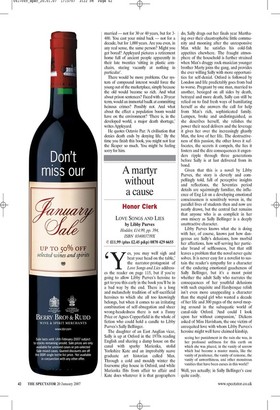A martyr without a cause
Honor Clerk LOVE SONGS AND LIES by Libby Purves Hodder, £14.99, pp. 394, ISBN 034083739X £11.99 (plus £2.45 p&p) 0870 429 6655 y es, you may well sigh and beat your head on the table,' the narrator-protagonist of Love Songs and Lies addresses the reader on page 115, but if you're going to allow Libby Purves's heroine to get to you this early in the book you'll be in a bad way by the end. There is a long and melancholy tradition of self-sacrificial heroines to which she all too knowingly belongs, but when it comes to an irritating combination of self-abnegation and sheer wrong-headedness there is not a Fanny Price or Agnes Copperfield in the whole of fiction who could hold a candle to Libby Purves's Sally Bellinger.
The daughter of an East Anglian vicar, Sally is up at Oxford in the 1970s reading English and sharing a damp house on the canal with sparky Marienka, stolid Yorkshire Kate and an improbably suave graduate art historian called Max. Through a cold and mouldy winter the foursome play house in Oxford, and while Marienka flits from affair to affair and Kate does whatever it is that geographers do, Sally drags out her finals year Marthaing over their claustrophobic little community and mooning after the unresponsive Max while he satisfies his cold-fish appetites elsewhere. The fraught atmosphere of the household is further strained when Max's druggy rock-musician younger brother Marty joins the gang, and provides the ever willing Sally with more opportunities for self-denial. Oxford is followed by London and life predictably goes from bad to worse. Pregnant by one man, married to another, besieged on all sides by death, betrayal and more death, Sally can still be relied on to find fresh ways of humiliating herself as she answers the call for help from Max's rich, sophisticated family. Lumpen, broke and undistinguished, as she describes herself, she relishes the power their need delivers and the leverage it gives her over the increasingly ghastly Max, the love of her life. The destructiveness of this passion, the other loves it suffocates, the secrets it compels, the lies it fosters and the dire consequences it engenders ripple through three generations before Sally is at last delivered from its bond.
Given that this is a novel by Libby Purves, the story is cleverly and compellingly told, full of perceptive insights and reflections, the Seventies period details are squirmingly familiar, the influence of Eng Lit on a developing emotional consciousness is sensitively woven in, the parallel lives of students then and now are neatly drawn, but the central fact remains that anyone who is as complicit in her own misery as Sally Bellinger is a deeply unattractive character.
Libby Purves knows what she is doing with her, of course, knows just how dangerous are Sally's delusions, how morbid her affections, how self-serving her particular brand of selflessness, but that still leaves a problem that the novel never quite solves. It is never easy for a novelist to sustain the reader's sympathy for a character of the enduring emotional gaucheness of Sally Bellinger, but it's a moot point whether the adult Sally who narrates the consequences of her youthful delusions with such exquisite and Hardyesque relish isn't even more unappealing a character than the stupid girl who wasted a decade of her life and 300 pages of the novel moping around in the subaquatic world of canal-side Oxford. And could I look upon her without compassion,' Dickens asked of Miss Havisham, the one victim of unrequited love with whom Libby Purves's heroine might well have claimed kinship, seeing her punishment in the ruin she was, in her profound unfitness for this earth on which she was placed, in the vanity of sorrow which had become a master mania, like the vanity of penitence, the vanity of remorse, the vanity of unworthiness, and other monstrous vanities that have been curses in this world?
Well, yes actually; in Sally Bellinger's case quite easily.





















































 Previous page
Previous page